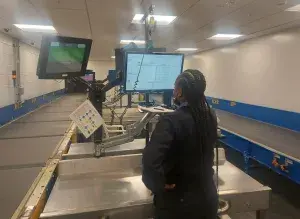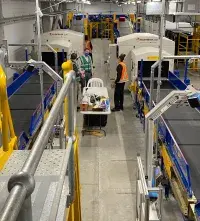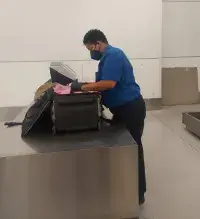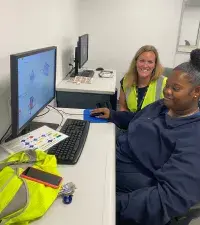 A Bermuda Security Group officer reviews checked bag IDs during a TSA on-site validation visit. (Photo by Danielle Fraher)
A Bermuda Security Group officer reviews checked bag IDs during a TSA on-site validation visit. (Photo by Danielle Fraher)
TSA is on the move to reduce the hassle for travelers flying into the U.S. from foreign countries without any reduction in security.
Bermuda’s L.F. Wade International Airport (BDA) recently became the first so-called Preclearance airport outside of Canada recognized under the No-Hassle Flying Act of 2012.
Preclearance, a joint DHS program between TSA and Customs and Border Protection (CBP), allows passengers to undergo full U.S. immigration and customs processing and TSA comparable passenger screening at a foreign airport before traveling to the U.S., so they don’t have to be rescreened when they arrive in the states.
Checked baggage does not have to be rescreened when it gets to the states from airports recognized under the No-Hassle Flying Act. For Preclearance airports not recognized by the Act, passengers don't have to be rescreened, but their checked bags do.
“While CBP conducts this processing at the foreign airport, TSA relies on the host government to ensure passenger screening is conducted using screening technology and procedures comparable to TSA,” described Danielle Fraher, a Preclearance program analyst for TSA’s International Operations. “Precleared flights then arrive at a domestic gate at a U.S. airport where passengers enter the sterile area without TSA rescreening.”
Under the No-Hassle Flying Act, airlines with flights arriving in the U.S. from Bermuda now have the luxury to transfer connected checked baggage directly to another aircraft without putting the luggage into a hold baggage system for TSA screening. As part of the deal, TSA is required to conduct annual visits to Preclearance locations to make sure those airports’ standards are comparable to TSA.
Administrator Pekoske authorized BDA’s new Preclearance checked baggage status after the airport underwent a major terminal building upgrade. It’s an agreement between TSA and Bermuda’s government.
“Having the opportunity to raise our global aviation baseline by being heavily engaged with our international counterparts from the blueprint stage to the grand opening of their state-of-the-art facility is extremely heartwarming,” said former TSA Representative (TSAR) to Bermuda Dwaine Murray.
“With our partners in Bermuda, we conduct assessments jointly with the United Kingdom,” Murray noted. “This is a force multiplier in enhancing aviation security measures and compliance oversight. TSA is committed to being a reliable partner of Bermuda, hold healthy dialogues, share information, innovate, develop new capabilities to build a security culture designed to strengthen global aviation security, and stay ahead of evolving threats.”
Fraher also believes it’s a big plus for U.S. screening officers.
“TSA no longer needs to allocate officers to checkpoints to screen passengers or checked baggage coming in from locations covered by the No-Hassle Flying Act, and management can allocate these officers to other screening areas,” she assessed.
TSA’s International Operations estimates the No-Hassle Flying Act saved TSA nearly $3.3 million in fiscal year (FY) 2022 and expects much higher savings in FY23. Fraher said only airports with signed Preclearance agreements can apply to be recognized under the Act, although she expects the number of Preclearance airports recognized under the Act to grow over the next few years.
“Right now, TSA has 15 Preclearance locations where passengers are not rescreened when transferring in the U.S., and nine are recognized under the No-Hassle Flying Act,” said Fraher. “We look forward to continued collaboration with other Preclearance airports (e.g., Dublin and Shannon, Ireland; Nassau, Bahamas; Abu Dhabi, United Arab Emirates; and Aruba) to work toward acquiring TSA-approved technologies for recognition as well as extend TSA’s footprint with other programs such as TSA PreCheck®.
“(TSA) has strong relationships with all of our Preclearance airports and continuously works with TSARs to provide Preclearance locations with the latest and greatest TSA products. We share TSA standard operating procedures, training materials, briefing materials, etc. Essentially, these locations are TSA checkpoints located in foreign countries, so it’s important that we continue to provide them with what they need to sustain comparability.
“Airlines are also aware of the benefits because of the cost savings to them as they are able to land at ‘domestic’ gates in the U.S. instead of an international terminal. It creates shorter turnaround times with baggage going tail-to-tail and passengers going directly to their connecting gates without rescreening, and they are able to land at more domestic airports because they no longer need to have U.S. CBP on-site.”
Seems like a win-win for all!
By Don Wagner, TSA Strategic Communications & Public Affairs



